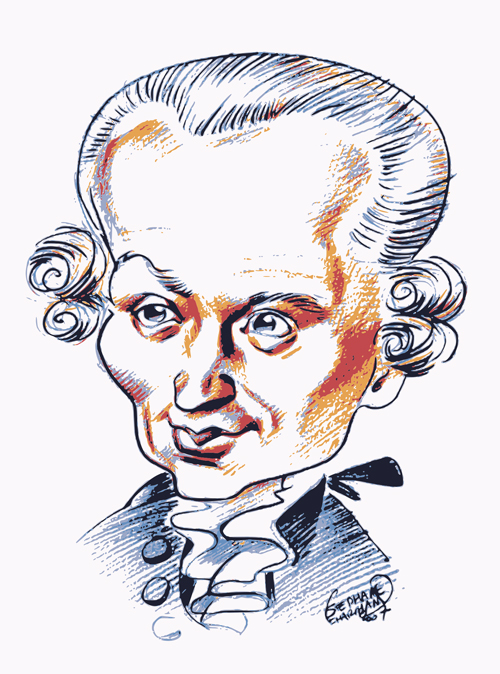
Your complimentary articles
You’ve read two of your four complimentary articles for this month.
You can read four articles free per month. To have complete access to the thousands of philosophy articles on this site, please
Intimate Diaries
Kant in the Café
Peter Mullen uncovers the personal secrets of philosophers.
I was in The Steaming Knicker in Stadtsbibliothek Strasse, my favourite coffee shop. When I say ‘I’, I mean of course that Thematic Unity of Apperception which is the consciousness of Immanuel Kant. I call it ‘the Thematic Unity of Apperception’ to facilitate comprehension.
Young Hermann, sitting again in the corner, enquired whether another cup of coffee would be liked by Immanuel Kant? “Affirmatively,” I answered, and reminded him: “Act only on that maxim which you could will to become a universal law.”
He replied, “That’s a pity, for I should like to buy you a cup of coffee; but now I’m scared to, because that would mean everyone in the world would be obliged to buy you a cup of coffee.” Then he asked me: “See that plate of cakes over there? Could you pass them to me, please?”
I was obliged to reprimand him for this elementary philosophical error: “Indeed that plate of cakes I see, but only in its phenomenal sense. The noumenal plate of cakes – the plate of cakes in itself (an sich) – see I not, for none may see it.”
The phenomenal Hermann huffed, crossed his phenomenal breast, and asked, “What then do you know, Immanuel?”
I replied that I knew how much the plate of cakes cost, because arithmetic is a form of knowledge which I classify as analytic ; but that I could conclude that the plate of cakes was, as we say, ‘there’ on that table at eleven o’clock in the morning only because space and time are necessary a priori conditions of thought. I further knew that the plate of cakes was intended for our enjoyment only because the relation of cause and effect is also a necessary a priori condition of thought. And thus my conclusion that the plate of cakes was on the table is an example of the knowledge which I call synthetic a priori.
“Good God!” responded Hermann.
“Freedom and immortality,” I quipped.
“Pass me a cake please,” said Hermann.
With his cake Hermann departed into the street, and I began to contemplate my eleventh antinomy this morning: it is possible that Immanuel Kant might drink another cup of coffee; and it is possible he might not. In either case his choice in this matter is completely free, and Kant knows this for certain; moreover, this knowledge is a priori.
At that moment, in walked God in his Sunday best, accompanied by St Thomas Aquinas and St Anselm. God ordered a coffee and proceeded to move in a mysterious way. St Anselm drank only water, while St Thomas asked for a quart of beer, which he drank in a single gulp, whereupon he ordered another, exclaiming, “One swallow does not make a Summa !”
St Thomas then approached me and upbraided me fiercely: “What is all this talk of yours, Herr Kant, to the effect that you have found fault with my Cosmological Proof of God? You are quite mistaken if you think this proof depends upon the world having had a beginning in time. My demonstration of the need for a First Cause declares instead that all events are contingent except the First Cause, which must be necessary in order to confer being upon what would otherwise have been only potential.” Meanwhile, the First Cause, in his aseity, lingered over his coffee.

Kant © Stéphane Lemarchand 2007 CC 3.0
St Anselm came across to add, “You have similarly dismissed my Ontological Proof of God by the mere suggestion that ‘existence is not a predicate’. Gaunilo also misunderstood me after this manner. But the point is rather this: God could not ‘just happen’ to exist. God is not contingent. His existence, therefore, is either impossible or necessary. Clearly, it is not impossible, for I can assert God’s existence without contradiction. Therefore, God exists. Quod Erat Demonstrandum.” And all the while, the Maker of the starry heavens above and the moral law within sat unmoved.
Feeling my free rational will being circumscribed and so recognising myself as not being treated as an end-in-myself, I begged leave of the three gentlemen and made my way back through the streets to begin the necessary revision of my Kritik der Reinen Vernunft. As I made my perambulation, I overheard one of the good burghers of Königsberg exclaim, “Set your watches, my friends. There goes Herr Professor Kant, dead on time!”
© Rev’d Dr Peter Mullen 2024
Peter Mullen is a philosopher and Anglican priest. His last cure of souls before he retired was Rector of St Michael’s, Cornhill, in the City of London.









